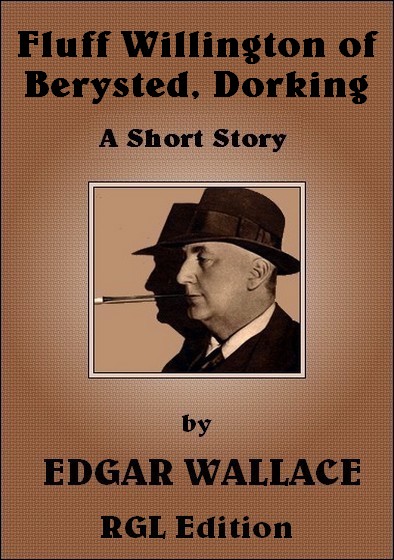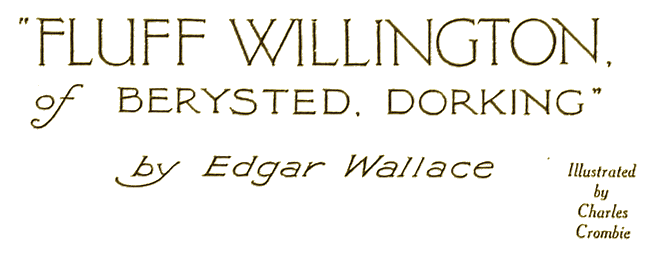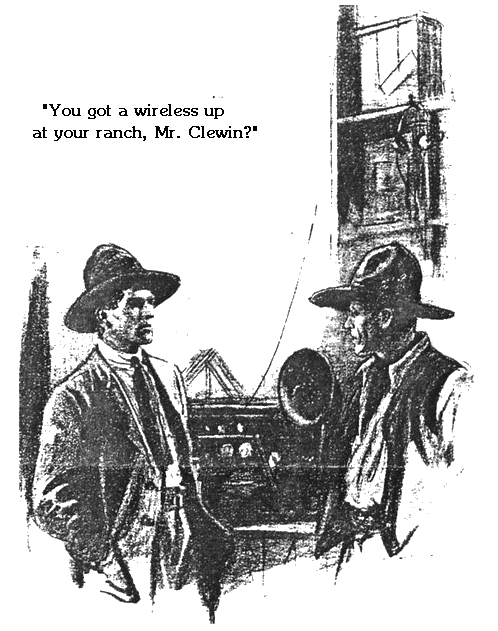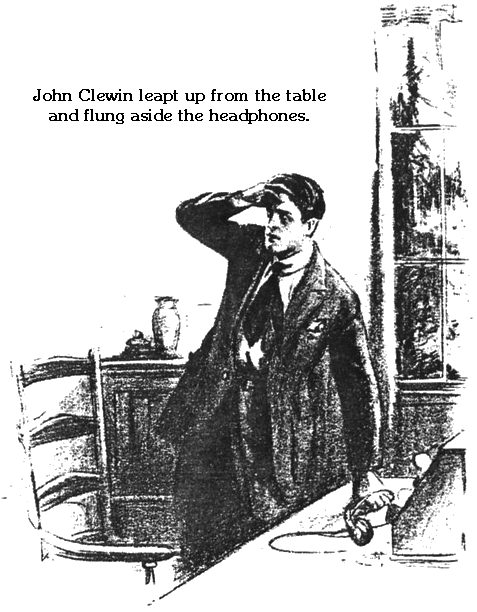
RGL e-Book Cover 2014©

RGL e-Book Cover 2014©

Title Graphic "Fluff Willington of Berysted, Dorking"
HURT and silent, Marjorie Clewin offered no explanation, made no excuses. Hurt he knew her to be, but how deeply wounded, he could not guess then. And it all started over the silliest discussion, as to whether or not they should go to Madrid for their summer holidays. It was hot in July, he granted. She might have said as much instead of her "Madrid! How absurd!"
Being young, and having within him the seeds of imperiousness, which success brings in its train, and which so often has the appearance of strength, and is the proof of weakness, he went up in the air. He wished he hadn't.
"Perhaps," he asked sarcastically, "you would like to come back to the ranch."
He knew she hated the ranch, the terrible loneliness which only the Canadian woman experiences, the loneliness which fills the asylums and mental hospitals, and breaks young women and leaves them old. It was a beautiful ranch, with mile upon mile of corn-land and the hoary heads of the Rockies to the West, but the tracks were twenty miles away at the nearest point, and Hambledon, which called itself a township, was little more than three grain elevators and a street of shacks, exactly fifty, and there was nothing to do in the world, except to ride and watch the corn and the hawks and an eagle or two that came down from the mountains in the colder weather, and when she said "No" this time her eyes were filled with tears. He thought it was temper. She was something of a fool, too, but young married people are not to be judged by ordinary standards.
And the end of it was that he went to the ranch alone, the last place in the world to which he intended going in the summer of the year. It was a wrench to leave Berysted and the park, and the wide fields, horrible to miss Ascot and Epsom, for he raced a few horses, but strangely enough, the real poignancy of the parting was not leaving his English home and the life he had learned to love, not even leaving Marjorie (their farewells were formal to a point of stiffness), but leaving Fluff Willington, his wife's one sister.
Fluff was nine, and had her name from the mop of goldy hair that defied the united efforts of nurse and maid to bring to order. And John Clewin and Fluff were the dearest of friends, exchanged confidences, listened in together at the Children's Hour, and shared her ecstasy when an unknown uncle addressed her by name and congratulated her upon attaining the dignity of eight. They rode together to the meets with Marjorie. Marjorie was sweet and daring and adorable in those days. She had not then developed her curious petulances, the long and painful silences, and her habit of brooding.
John was down at Hambledon one day and called in at the Universal Canadian Electrical Depot to buy stores, and saw a familiar object standing on a pedestal by itself, the identical instrument he had bought for Fluff. It gave him a little pang to see it, though Fluff was a regular correspondent and sent him long and exciting stories of her adventures, but was so irritatingly silent about Marjorie, that he guessed that some sort of censorship prevailed, and that her fiat had gone forth that no mention of her was to appear. As to Marjorie she had not written at all in the six months he had been in Canada, except to acknowledge with unnecessary curtness the expensive present he had bought for her in Winnipeg.
"You got a wireless up at your ranch, Mr. Clewin?" asked the store-keeper.

"No, I haven't," said John briefly.
"Orter have a set," said the man, "specially now they arc relaying from England."
"Do you get receptions from England?" asked John incredulously.
"Sure we do," said the enthusiastic amateur, "and that," he pointed to the instrument, "brings Winnipeg on to your porch. I've had St. Paul, too, and Philadelphia. Why, I've got receptions from Sacramento on one valve! I guess the waves kinder travel along the Rockies."
John thought for a moment.
"Send it up," he said.
He had an aerial fixed the next day and spent three pleasant nights in experimental work. On the fourth night the Winnipeg announcer had an important statement to make.
"At eight o'clock to-morrow morning, which is five o'clock in the afternoon in England, we are hoping to get a daylight relay from London. England...."
He expatiated on the difficulties of daylight reception, dwelt learnedly and enthusiastically upon the improvements which the new beam projector had brought to wireless telegraphy, and excused in advance, as all careful announcers will, the possible failure of the transmission.
John listened, more or less bored, and tuned in to St. Paul, without any great satisfaction to himself. He tried Vancouver and got nothing, and went out into the ether and connected himself with a station where somebody was singing a Spanish song and singing it vilely!
The mail came by car from Hambledon just before he went to bed. There was a letter from Fluff. He went eagerly through the remainder.
"Not a line from Marjorie!" he thought savagely. "Out of sight out of mind."
He, who had begun his voluntary exile with the feeling that he had acted badly, had waited with his trunks packed for the word that would call him back to England full of penitence and self-reproach, was beginning to believe in a grievance which had not (and he was the first to admit this) existed when the C.P.R. steamer passed down the Mersey.
She must hate him, or she would never treat him so, and they had been so happy that first year of their married life. It had been ideal, would be ideal still, it she had been gracious enough to overcome her repugnance to sweltering Madrid. Why he had wanted to go to Madrid at all at that unseasonable time, when all the court was at Santander, he had long since forgotten, but there was a good and sufficient reason—he remembered now, there was to be a produce race in which he had entered a horse.
Marjorie did not understand him. It was an illusion largely shared by other young men and by other young wives.
He was at his breakfast the next morning and, for him, in an unpleasant mood. The waffles were burnt, the eggs were not done, the ham was salt, nothing was right for him. He got up from the table, pulled his watch from his belt-pocket and stood undecided as to whether he should drive into Hambledon and rustle a bridge party, or whether—eight o'clock, he remembered the announcer and was sufficiently curious to tune in and put on his phones.
There was no sound, except the whir of the carrier wave, and then he saw Fluff's letter unopened on the side-board, and reaching out his hand for it, tore open the envelope.
As he read the first words he uttered an exclamation of dismay.
"Darling Johnnie," it began, "fancy, I shall be nine on the 12th June—"
The 12th—to-day! And he had sent her no present, no word. A cable might remedy that, but he would not be in time. The day was fading in England, and even the most expeditious of despatches could not get a wire through to Berysted that night. He had half-risen when a voice said in his ear:
"Stand by, please, for London, England."
A curious jangle and confusion of sound and then out of the mist came a pleasant voice, and he recognised at once that they had broken in upon the Children's Hour.
"Is that Mary Ellen Jones, of Tooting? Glad to hear from you, Mary. It is lovely having such a nice present from your mother. Many happy returns! Harry Franklin of Watford. Hallo, Harry! Congratulations on your birthday, old boy. You must be getting a big boy now. I hope you will enjoy your party. Fluff Willington, of Berysted, Dorking. Hallo, Fluff. Many happy returns! I am glad to hear that you are now a proud aunt, and have a little baby nephew. I hope your sister is—"

John Clewin leapt up from the table, flung aside the headphones, and yelled for his car. The train that came through Hambledon at 10.30 connected with the C.P.R. mail steamer.